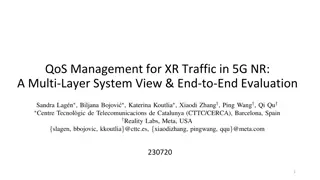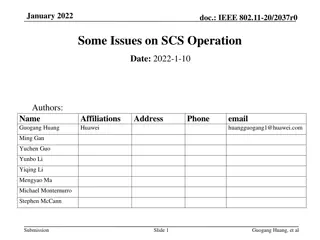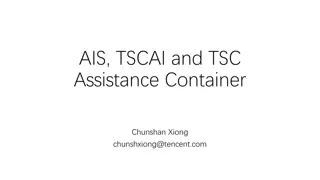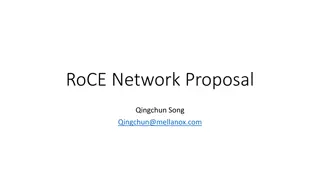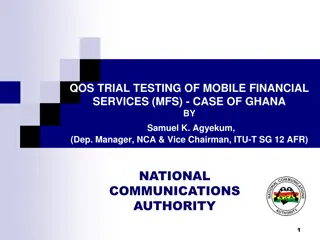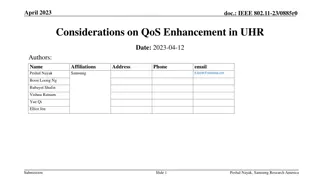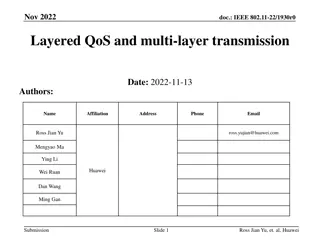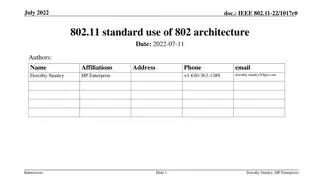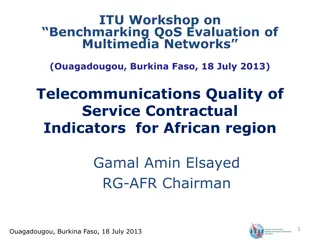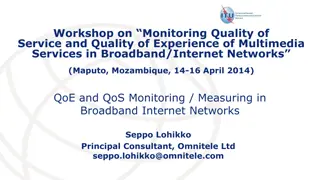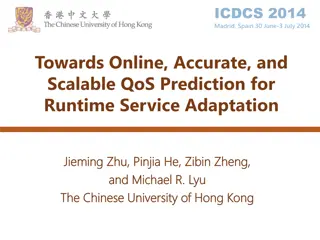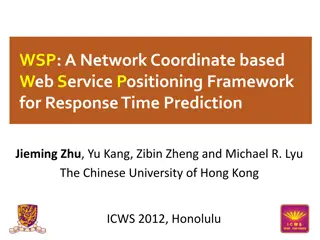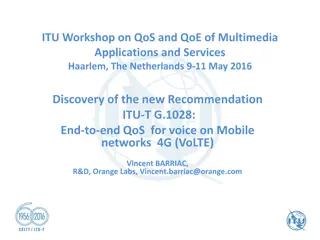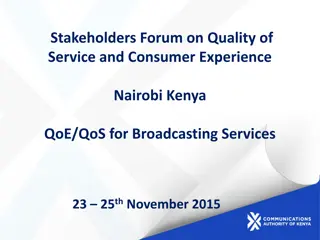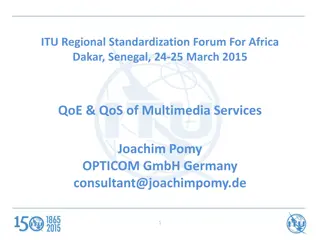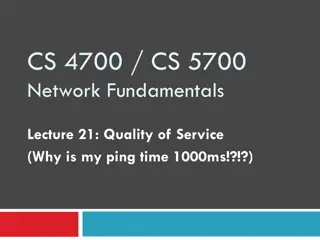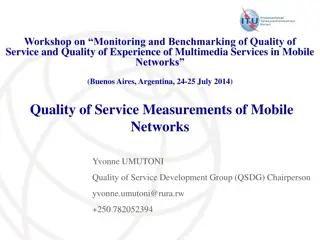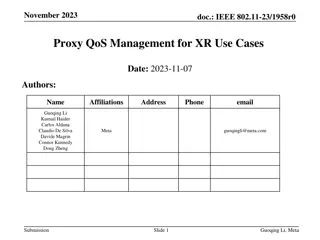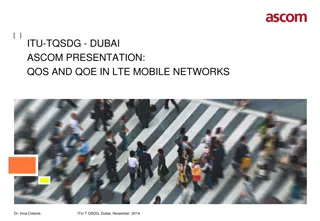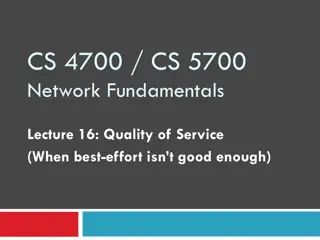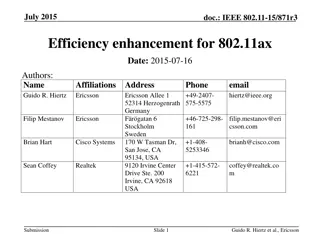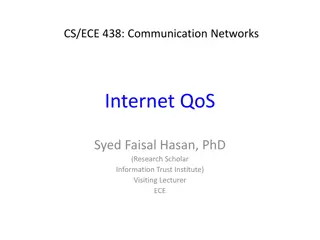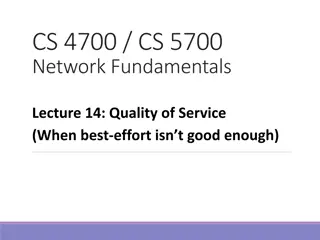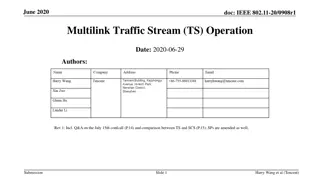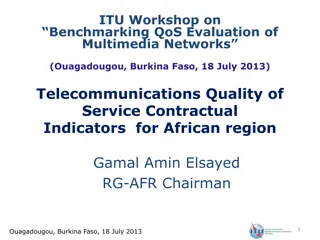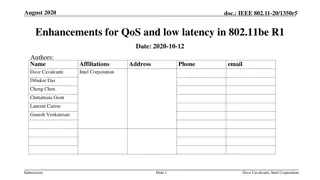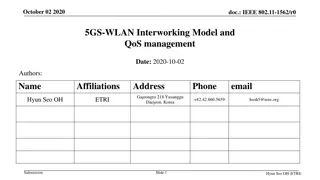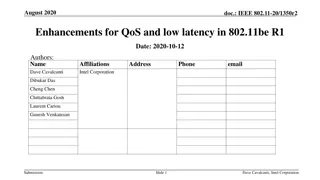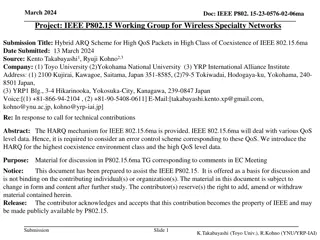System Models in Software Engineering: A Comprehensive Overview
System models play a crucial role in software engineering, aiding in understanding system functionality and communicating with customers. They include context models, behavioural models, data models, object models, and more, each offering unique perspectives on the system. Different types of system
6 views • 33 slides
5G NR Traffic QoS Management: Multi-Layer System View & End-to-End Evaluation
5G NR technology emphasizes enhanced QoS for XR traffic, including AR, VR, and Cloud Gaming. This research delves into handling QoS for XR/CG traffic at various layers, proposing QoS control mechanisms at the application and MAC layers, along with an evaluation of these approaches using a simulator.
7 views • 14 slides
Enhancing QoS Facility for Low-Latency High-Throughput Performance in IEEE 802.11 Networks
This proposal addresses the shortcomings in traffic classification and handling of uplink/downlink traffic in current IEEE 802.11 specifications, particularly in relation to low-latency traffic. It also highlights issues with the current EDCA mode in managing congestion and proposes high-level solut
8 views • 18 slides
Issues with SCS Operation in IEEE 802.11be Standard
The document discusses technical issues related to the SCS (Spatial Channel Sharing) operation in the IEEE 802.11be standard. It highlights inconsistencies in the standard regarding parameterized QoS requirements, mixing of traffic streams with different QoS needs, and challenges in prioritizing SCS
2 views • 15 slides
Time Synchronization in Cloud Gaming Services
Cloud gaming services like AIS, TSCAI, and TSC Assistance Container play a crucial role in providing quality of service (QoS) to millions of users globally. The need for time synchronization in 5G networks, especially for industrial applications like AR/VR, is highlighted. Trusted AF entities can di
0 views • 4 slides
Enhancing Network Performance with RoCE Technology
Remote Direct Memory Access (RDMA) benefits, RoCEv2 packet format, resilient RoCE feature progression, optimizing network performance with QoS, and RoCE congestion control convergence analysis are discussed in this proposal. RoCE technology offers low latency, high throughput, and efficient CPU usag
0 views • 19 slides
Quality of Service (QoS) Trial Testing of Mobile Financial Services in Ghana
The National Communications Authority in Ghana conducted a QoS trial testing exercise on mobile financial services to assess compliance with QoS targets and consumer protection readiness. The test methodology involved using the SIGOS Integrated Test Environment system for billing verification on mob
5 views • 12 slides
Enhancing Quality of Service in Ultra High Rate Wi-Fi Networks
This document explores the potential improvements in Quality of Service (QoS) for Ultra High Rate (UHR) Wi-Fi networks, focusing on the benefits of timing information sharing for traffic urgency assessment. It discusses areas such as increased reliability, lower latencies, improved manageability, an
0 views • 11 slides
Layered QoS and Multi-Layer Transmission in IEEE 802.11-22 for Enhanced WLAN Performance
The document discusses the importance of layered Quality of Service (QoS) and multi-layer transmission in meeting the high throughput and real-time requirements of metaverse applications over WLAN. It emphasizes the need for enhanced throughput, reliability, reduced latency, and improved power effic
0 views • 11 slides
IEEE Std. 802.11-22/1017r0 Overview and Architecture Presentation
This presentation by Dorothy Stanley from HP Enterprise delves into the utilization of IEEE Std. 802.11-2020 standards focusing on the IEEE Std. 802 overview and architecture. It covers topics such as the use of LLC, MAC address formats, QoS mechanisms, MSDU formats, and various MAC services and pro
1 views • 10 slides
Enhancing Contractual Parameters for Telecommunications Quality in Africa
Workshop in Ouagadougou focused on benchmarking QoS evaluation of multimedia networks, highlighting the importance of QoS, priority of contractual matters, inadequacy of E-803 for African region, and the role of regulators in customer rights. Suggestions included additional contractual parameters to
2 views • 18 slides
Enhancing Multimedia Services in Broadband Networks through QoE and QoS Monitoring
Explore the significance of Quality of Service (QoS) and Quality of Experience (QoE) monitoring in broadband internet networks, as discussed at a workshop in Maputo, Mozambique. Learn about Omnitele's approach to measuring end-user QoS and QoE, aiming to maximize customer experience and minimize net
0 views • 38 slides
Scalable QoS Prediction for Service Adaptation in Service-Based Applications
This study delves into the challenge of predicting Quality of Service (QoS) for runtime service adaptation in service-based applications. It explores collaborative filtering and adaptive matrix factorization techniques for accurate QoS prediction, aiming towards enhancing service resilience and redu
1 views • 29 slides
Network Coordinate-based Web Service Positioning Framework for Response Time Prediction
This paper presents the WSP framework, a network coordinate-based approach for predicting response times in web services. It explores the motivation behind web service composition, quality-of-service evaluation, and the challenges of QoS prediction. The WSP framework enables the selection of web ser
1 views • 30 slides
Introduction to ITU-T G.1028: End-to-End QoS for VoLTE on 4G Networks
This overview covers the journey and development of ITU-T G.1028, focusing on end-to-end quality of service (QoS) for Voice over LTE (VoLTE) on 4G networks. It details the background, key milestones, essential elements of VoLTE services, optional mechanisms considered, QoS classifications, and call
0 views • 14 slides
Evolution of QoS/QoE in Broadcasting Services
Consumers and regulators are driving the need for established Quality of Service (QoS) and Quality of Experience (QoE) standards in broadcasting services. Stakeholders in Nairobi discussed the importance of ensuring signal quality, video/audio performance, and transmission metrics to meet subscriber
0 views • 12 slides
Quality of Experience (QoE) and Quality of Service (QoS) for IPTV Services
Explore the concepts of QoE and QoS for IPTV services, including user requirements, important definitions, QoE dimensions, compression artifacts, and components affecting channel zapping time. Learn about clean audio, VoD trick modes, triple play services, and more in this informative collection.
1 views • 13 slides
Quality of Service (QoS) in Network Fundamentals
Network Fundamentals Lecture 21 delves into Quality of Service (QoS) in networking, addressing the importance of prioritizing certain types of traffic based on factors like application performance, traffic importance, and service levels. The lecture explores the challenges of sharing resources among
0 views • 29 slides
Workshop on Monitoring and Benchmarking of Quality of Service and Quality of Experience in Mobile Networks
Presentation focusing on quality of service monitoring and enforcement in mobile networks from a regulatory viewpoint. Covers purposes of QoS regulations, requirements for regulators, auditing methods, and QoS parameters for mobile services.
0 views • 14 slides
Proxy QoS Management for XR Devices in IEEE 802.11-23/1958r0 - November 2023
This document discusses the challenges faced by XR devices in terms of size, thermal constraints, cost, and power limitations leading to the proposal of Proxy QoS Management to enhance Wi-Fi performance. The aim is to leverage TGbn devices for improving legacy devices' connectivity within a Wi-Fi ne
0 views • 6 slides
Quality of Service and Experience in LTE Mobile Networks
Presentation by Dr. Irina Cotanis from ITU-T QSDG in Dubai, November 2014, covering topics like LTE QoS/QoE, KPI mappings, challenges, and more in the context of mobile network performance. Learn about ASCOM's approach to QoS and QoE cycles, LTE QoE-QoS-KPI relationships, cost-efficient top-down app
0 views • 21 slides
QoS Performance Analysis
This paper discusses the suitability of slotted CSMA/CA for Wireless Sensor Networks (WSNs) and focuses on the beacon-enabled mode for IEEE802.15.4. It analyzes the performance of the protocol in terms of Quality of Service (QoS) but lacks a practical intuitive understanding of QoS. The study provid
0 views • 22 slides
Enhanced Device Connectivity with Robust QoS Support
The document discusses technologies for improved device connectivity in future Wi-Fi networks with diverse traffic types and Quality of Service (QoS) requirements, focusing on discovery and setup of P2P links and better traffic management for enhanced overall network performance.
1 views • 8 slides
Enhanced Device Connectivity with Robust QoS Support
With the proliferation of IoT devices and AR/VR applications, future Wi-Fi networks must support varying traffic types and QoS requirements. This document highlights enabling technologies for improved device connectivity and QoS support, focusing on areas such as discovery and setup of P2P links, be
0 views • 18 slides
Overview of AeroMACS QoS Concepts and Diffserv Implementation
This document delves into the Quality of Service (QoS) concepts in AeroMACS, including various service flows and Diffserv implementation for IP QoS. It explores the different types of services like UGS, rtPS, nrtPS, and Best Effort, as well as Diffserv classifications such as EF, AF, and BE. Additio
0 views • 12 slides
AeroMACS QOS Concepts and Applications
Exploring the diverse Quality of Service (QOS) concepts in AeroMACS technology, including Unsolicited Grant Service, Real-time Polling Service, Non Real-Time Polling Service, and Best Effort. Delve into IP Quality of Service with Diffserv reassignment and packet classification using concepts like Ex
0 views • 10 slides
Network Quality of Service: Improving Traffic Prioritization for Better Performance
Explore the concept of Quality of Service (QoS) in network fundamentals, which aims to provide better service to important traffic by prioritizing certain packets. Learn about factors influencing application performance, the need for bandwidth, and managing resources between applications. Discover s
0 views • 29 slides
ASR9K BNG Session SPI Feature for H-QoS Implementation
Learn how to implement High Quality of Service (H-QoS) with the ASR9K BNG Session SPI feature to manage traffic for single subscriber multi-session scenarios. Create aggregated shapers for all subscriber traffic and apply session-based QoS to individual user devices. Explore examples and use cases f
0 views • 7 slides
Efficiency Enhancement for IEEE 802.11ax: Innovations and QoS Management
Explore efficiency enhancements for IEEE 802.11ax focusing on improvements beyond peak performance, addressing management overhead, QoS management, Proxy ARP support, and intra-access category prioritization in dense deployments. The study emphasizes the need for High Efficiency (HE) STAs to support
0 views • 30 slides
End-to-End QoS Measurement in IEEE 802.11 Networks
Delve into the latest QoS management mechanisms in IEEE 802.11 networks, focusing on Stream Classification Service, Mirrored Stream Classification Service, Restricted Target Wake Time, and more. Explore the considerations for measuring end-to-end QoS in Wi-Fi networks where these mechanisms are depl
0 views • 13 slides
Understanding QoS Architectures in Communication Networks
Explore Quality of Service (QoS) in Internet Communication Networks, the need for QoS to support different services, and the comparison between Integrated Services (IntServ) and Differentiated Services (DiffServ) architectures for QoS implementation.
0 views • 22 slides
Mastering Network Fundamentals: Quality of Service and Traffic Prioritization
Explore the concepts of Quality of Service (QoS) in networking, where best-effort service may not suffice. Understand the motivations, relevant factors, and strategies for prioritizing traffic based on application performance needs. Delve into QoS mechanisms like packet shaping, DiffServ, and IntSer
0 views • 29 slides
IEEE 802.11-20/0908r1 Multilink Traffic Stream Operation Overview
Learn about IEEE 802.11-20/0908r1, focusing on Multilink Traffic Stream (TS) operation, TS establishment between SMEs, QoS parameter values, MAC entities' role in determining TSPEC, traffic classification, amendments on TS operation, QoS architecture, and MLD QoS architecture. Explore the details of
0 views • 20 slides
Optimizing QoS for XR Traffic in 5G NR Networks
Explore the multi-layer system view and end-to-end evaluation of QoS management for XR traffic in 5G NR networks. Discover the challenges, solutions, and architectural insights for handling QoS requirements in next-generation networks.
0 views • 14 slides
QoS Evaluation and Contractual Matters in African Telecommunications
Explore the proceedings of the ITU Workshop on Benchmarking QoS Evaluation in Multimedia Networks in Ouagadougou, Burkina Faso. Topics covered include the importance of QoS, priority of contractual matters, inadequacies in E-803 parameters for the African region, and the role of the regulator in cus
0 views • 18 slides
Enhancements for QoS and Low Latency in IEEE 802.11be Standard
Explore the proposed enhancements for Quality of Service (QoS) and low latency in the IEEE 802.11be standard, aligning with emerging AR/VR/TSN/Cloud/Gaming/IoT applications. The presentation delves into the need for improved QoS signaling mechanisms and the incorporation of new parameters for next-g
1 views • 15 slides
IEEE 802.11 WLAN Interworking Model for 5G QoS Management
This document discusses the interworking model between IEEE 802.11 WLAN and 3GPP 5G systems to enhance data throughput and manage Quality of Service (QoS) for different traffic types. It covers tightly coupled and loosely coupled interworking types, functional models in 5G systems, and Traffic Selec
0 views • 11 slides
QoS Mapping Update for IEEE 802.11 Networks
Explore the need to update the DSCP to UP mapping in IEEE 802.11-2016 for enhanced end-to-end QoS intent alignment, highlighting industry consensus shifts and the importance of accurately representing QoS labels.
0 views • 13 slides
Enhancements for QoS Management in IEEE 802.11be Standard
Explore the proposal for enhancing Quality of Service (QoS) management in the IEEE 802.11be standard to address low latency needs for emerging applications like AR, VR, TSN, Cloud, Gaming, and IoT. The presentation outlines the current proposals and introduces a common signaling framework for specif
0 views • 14 slides
Hybrid ARQ Scheme for High QoS in IEEE 802.15.6 Networks
Explore a hybrid ARQ mechanism developed by Kento Takabayashi and Ryuji Kohno for IEEE 802.15.6 networks, addressing high QoS data transmission requirements in complex coexistence environments. Learn about the importance of QoS control and error correction schemes tailored for various data types wit
0 views • 15 slides

